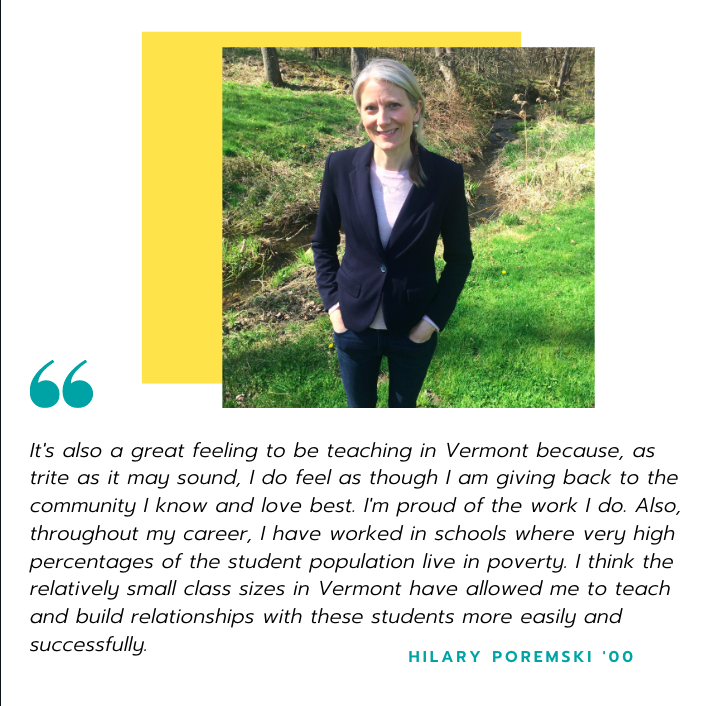The transition to remote learning brought the crucial role of educators to the foreground. We wanted to take this time to reach out to some Middlebury alumni educators teaching in Vermont and recognize them for all the work they do, including their efforts to stay connected with students during this isolation period.
Hilary Poremski majored in English, with a concentration in creative writing and a minor in teacher education and psychology. She graduated from Middlebury in May of 2000. During her student years, Hilary engaged with the community through her working at the Addison County Parent-Child Center, developing close relationships with staff members, children, and fellow Middlebury students who also worked there.
Hilary is currently in her 14th year teaching at Rutland High School. Prior to teaching at RHS, she began her career at Spaulding High School in Barre, where she taught from 2001-2006. Her experience as a teacher in Vermont “has been as rewarding as it has been challenging.” She reflects: “It took me years to discover my identity and strengths as a teacher — to learn how to manage and instruct teenagers effectively and confidently, to connect with them personally, to regard them with unconditional compassion.”
While it has been difficult at times, Hilary has received much support from gifted mentor-colleagues, many of whom are now life-long friends. She writes: “They represent what I believe is an exceptionally strong state-wide public school faculty...My own excellent high school teachers (at Otter Valley Union High School in Brandon) first inspired me to want to become an English teacher in 8th grade, and I am so happy to say that I am now almost 20 years into the career I envisioned for myself as an adolescent.”

When asked what drew her to staying in Vermont, Hilary explained that she has a long family history in the state: “I am a fourth generation Vermonter, still living on the land my Polish great-grandparents farmed after immigrating to the U.S. and initially working in the marble industry over a century ago. (In fact, this “family history of place” was the subject of my undergraduate honors thesis at Middlebury). Simply put, I have never been drawn to actually live outside of Vermont, given my very deep and personal ties to this place. My relationships with my family and now-husband also played a role in keeping me here during those years after college graduation when many move elsewhere. And I knew I would (eventually) find a teaching job in Vermont. In this sense, multiple factors converged to keep me here.”
For Hilary, the transition to remote learning has been relatively easy in terms of technology and logistics, thanks to her district’s resources and the user-friendliness of tools such as Google Classroom. However, in all other aspects, that it has been stressful, sad, and difficult:
Students who were chronically absent or already difficult to engage in the classroom have been almost impossible to reach remotely, and some have fallen off the map entirely in spite of my ongoing efforts to connect. Hosting online classes via Google Meet doesn’t feel like teaching. It’s amazing how much gets lost when I am not physically in a classroom with my students — in particular, the ability to circulate around the room, check in on my students’ progress, and offer on-the-spot help and one-to-one instruction.”
Hilary Pormeski
Hilary misses many aspects of in-person teaching, including “the personal connections–conversations, moments of laughter, and banter, seeing and hearing [her] students in person, [her] colleagues, some of whom are [her] dearest friends.” On top of teaching full-time at home, she is also parenting her 2-year-old and 7-year-old children. “Their needs are constant,” she writes, “not to mention the fact that I’m responsible for my 7-year-old’s homeschooling. It is extremely nerve-racking and draining.”
For the past few years, Hilary and her colleague, friend, and fellow Midd alum Claire Groby have brought their students on field trips to the college, where they’ve connected with international, study-abroad, and upper-level language students in the CCE’s Language in Motion program. Hilary states: “It has been such a wonderful opportunity for all of us to learn about each other’s home states, countries, and cultures. It has helped to challenge stereotypes and find common unity, which is one of the main themes of Global Studies 10 (sophomore English and World History II at Rutland High School). We really look forward to resuming these field trips when it becomes possible again!”
Thank you, Hilary!
Stay tuned for more stories from Middlebury Alumni Educators!
